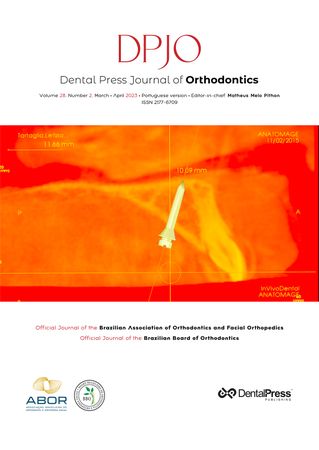
Seu carrinho está vazio!
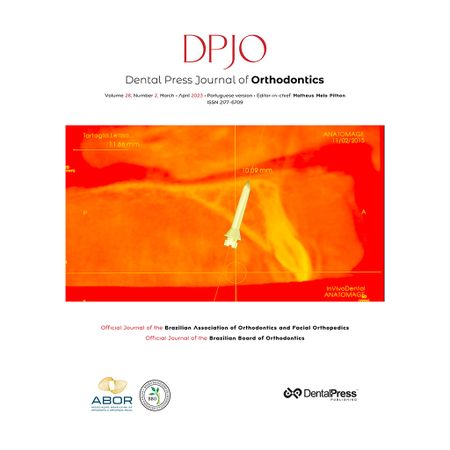
Artgio DIsponível em InglêsObjetivo: Estudar a viabilidade do método Time trade-off (TTO) para quantificar escores de valoração da saúde em diferentes tipos de má oclusão. Material e Métodos: Neste estudo transversal, foram incluídos e entrevistados 70 pacientes ortodônticos com idade igual ou superior a 18 anos, que compareceram para tratamento/consulta. A valoração da saúde em relação à má oclusão foi avaliada por meio do método TTO e a qualidade de vida relacionada à...

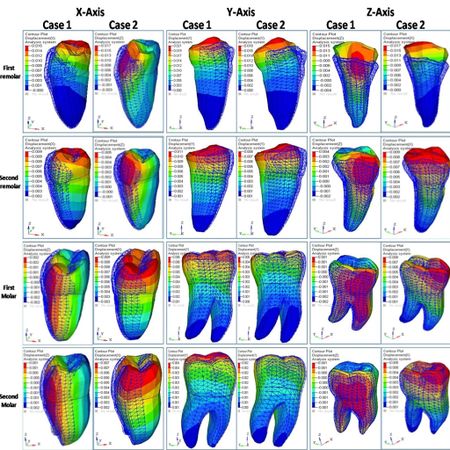
Artigo Disponível em InglêsObjective: To compare the initial stress distribution and displacement on mandibular dentition using extra and inter-radicular mini-implants for arch distalization using finite element analysis. Methods: For this study, two finite element models of mandible were designed. The models consisted of periodontal ligament (PDL), alveolar bone of all the teeth till second molars. In the first case, bilaterally extra-radicular buccal-shelf mini-implants made of Stainless...

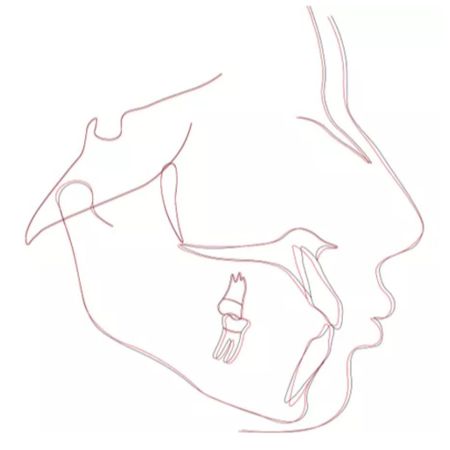
Objective: The objective of this two-arm parallel randomized controlled trial was to evaluate the treatment effects and lip profile changes in skeletal Class II patients subjected to premolars extraction treatment versus fixed functional treatment. Methods: Forty six subjects fulfilling inclusion criteria were randomly distributed into Group PE (mean age 13.03±1.78 years) and Group FF (mean age 12.80±1.67 years) (n=23 each). Group PE was managed by therapeutic extraction of maxillary first...

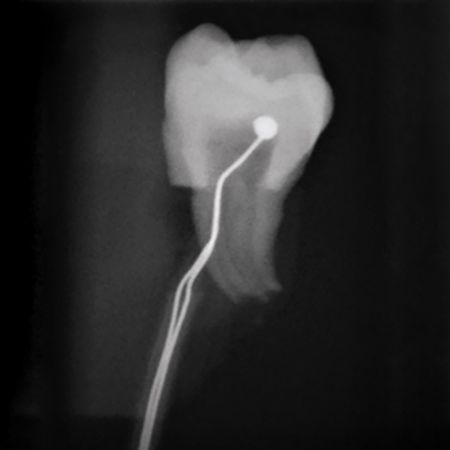
Artigos Disponíveis em InglêsObjetivo: Comparar o aumento na temperatura da câmara pulpar (ATCP) na colagem de braquetes com fotoativação usando ou não primer, em dentes hígidos versus dentes restaurados, em incisivos centrais inferiores (ICI), primeiros pré-molares superiores (1PMS) e terceiros molares inferiores (3MI). Métodos: Foram incluídos noventa dentes humanos: ICI (n=30), 1PMS (n=30) e 3MI (n=30). A colagem de braquetes com fotoativação foi realizada em dentes hígidos...

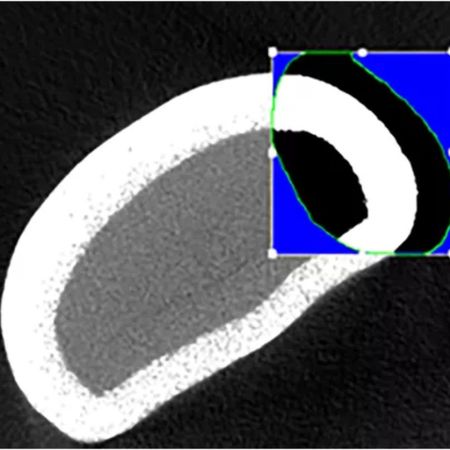
Objective: To measure enamel thickness at the proximal surfaces of the mandibular incisors, using micro-computed tomography (micro-CT) scans. Material and Methods: Forty-one single-rooted mandibular incisors were selected and analyzed according to anatomical characteristics, to form three groups: Group 1 – central incisors (n = 18); Group 2 – right lateral incisors (n = 10); and Group 3 – left lateral incisors (n = 13). First, enamel thickness at the proximal contact areas of the...

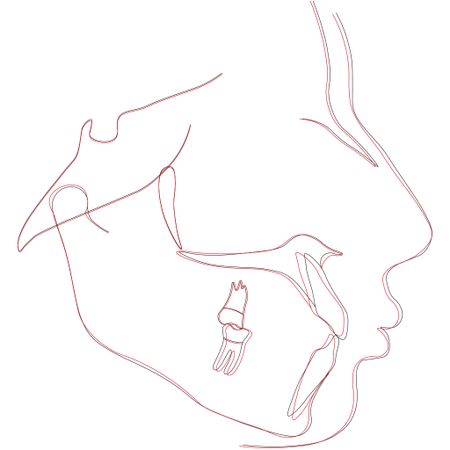
Artigo Disponível em InglêsObjetivo: O objetivo desse estudo randomizado controlado paralelo de dois braços foi avaliar os efeitos do tratamento e as mudanças no perfil labial em pacientes esqueléticos Classe II submetidos a tratamento com extração de pré-molares (EP) versus tratamento funcional fixo (FF). Métodos: Quarenta e seis indivíduos que preencheram os critérios de inclusão foram distribuídos aleatoriamente em Grupo EP (idade média 13,03±1,78 anos) e Grupo FF (idade...

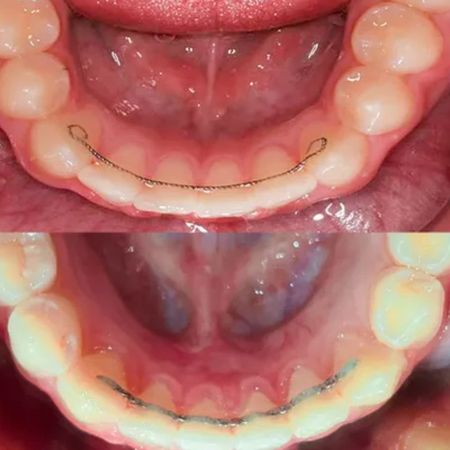
Objective: The primary objective was to compare round multi-strand wire and Ortho- Flex-Tech™ rectangular wire retainers in terms of gingival health. The secondary objectives were to assess plaque/calculus accumulation, and to determine the effectiveness of these retainers in maintaining tooth alignment and their failure rate. Material and Methods: This single-center study was a two-arm parallel randomized clinical trial and was conducted at the Orthodontic clinics in Dental Teaching...

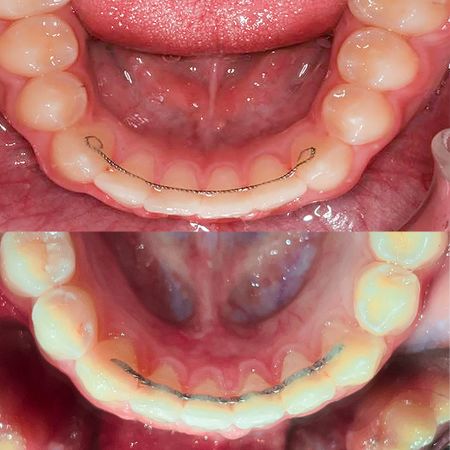
Artigo Disponível em InglêsObjetivo: O objetivo principal desse estudo foi comparar a saúde gengival após o uso dedois tipos de contenção: uma feita com fio redondo multifilamentado e outra feita com fioretangular Ortho-Flex-Tech™. Os objetivos secundários foram avaliar o acúmulo de placa/cálculo, determinar a eficácia dessas contenções em manter o alinhamento dos dentes,bem como sua taxa de falha. Material e Métodos: Esse foi um estudo unicêntricodo tipo ensaio clínico...

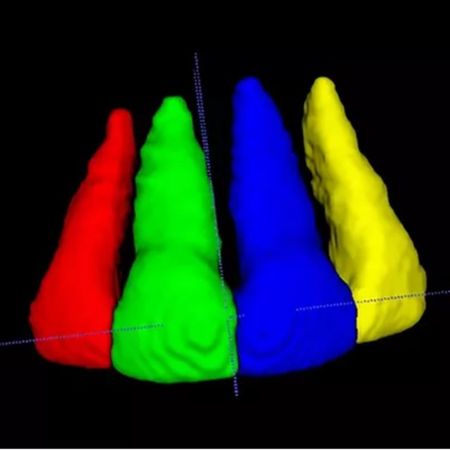
Objective: The aim of this study was to evaluate the volumetric root resorption in maxillary incisors following clear aligner therapy (CAT) with low-intensity pulsed ultrasound (LIPUS), and compare the results to CAT alone. Material and Methods: This retrospective study evaluated pretreatment (T0) and post-treatment (T1) cone-beam computed tomography imaging of 42 adult patients. Twenty-one patients (14 females, 7 males, mean age= 38.1±12.96 years) were treated using CAT with LIPUS device,...

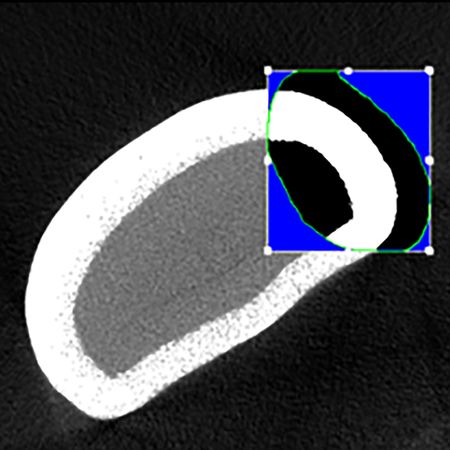
Artigo Disponível em Inglês Objetivo: Medir a espessura do esmalte nas superfícies proximais dos incisivos inferiores, usando imagens de microtomografia computadorizada (micro-CT). Material e Métodos: Quarenta e um incisivos inferiores com raiz única foram selecionados e analisados de acordo com as características anatômicas, formando três grupos: Grupo 1 – incisivos centrais (n = 18); Grupo 2 – incisivos laterais direitos (n = 10); e Grupo 3 – incisivos laterais esquerdos (n =...

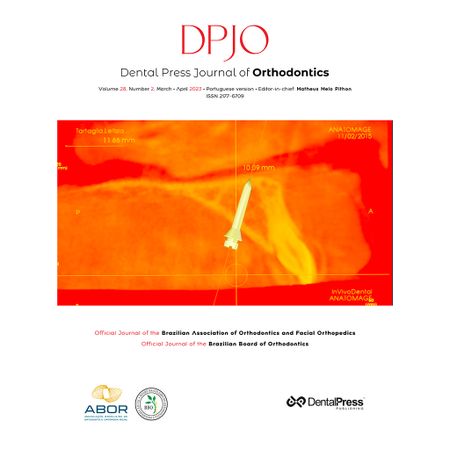
Objective: To study the feasibility of time trade-off (TTO) method in quantifying health utility ratings in different types of malocclusion. Material and Methods: In this cross-sectional study, 70 orthodontic patients aged 18 years or above, reporting for treatment/ consultation, were included and interviewed. Malocclusion- related health utilities were assessed through the TTO method, and oral health-related quality of life was measured with the help of Orthognathic Quality of Life...

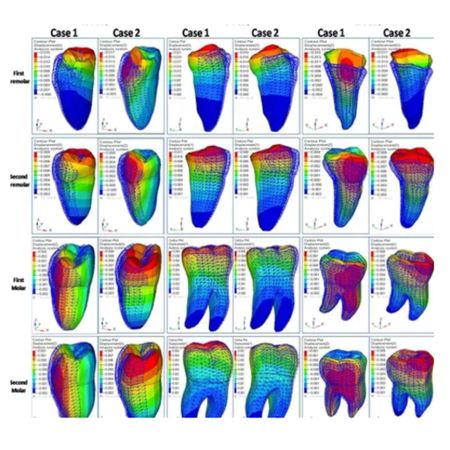
Objective: To compare the initial stress distribution and displacement on mandibular dentition using extra and inter-radicular mini-implants for arch distalization, by means of finite element analysis. Methods: For this study, two finite element models of the mandible were designed. The models consisted of periodontal ligament (PDL) and alveolar bone of all teeth until second molars. In the Case 1, bilateral extra- radicular buccal-shelf stainless steel mini-implants (10.0-mm length; 2.0-mm...

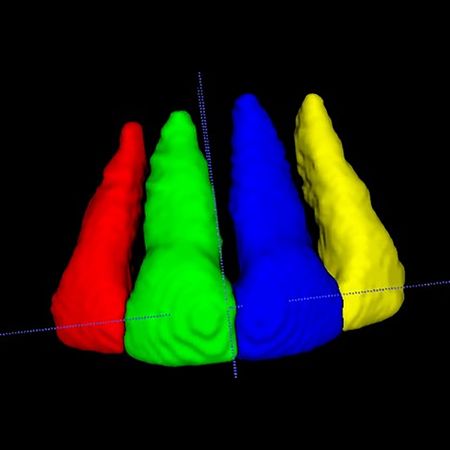
Artigo Disponível em Inglês Objetivo: O objetivo deste estudo foi avaliar volumetricamente a reabsorção radicular em incisivos superiores após tratamento com alinhadores transparentes (CAT) com e sem uso adjuvante de ultrassom de baixa intensidade (LIPUS). Material e Métodos: Esse estudo retrospectivo avaliou imagens de tomografia computadorizada de feixe cônico pré-tratamento (T0) e pós-tratamento (T1) de 42 pacientes adultos: 21 pacientes (14 mulheres, 7 homens, idade média=...

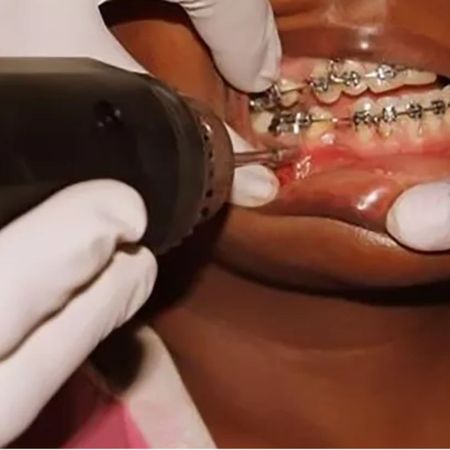
Objectives: This clinical trial was conducted to evaluate the stability and failure rate of surface-treated orthodontic mini-implants and determine whether they differ from those of non-surface-treated orthodontic mini-implants. Trial Design: Randomized clinical trial with a split-mouth study design. Setting: Department of Orthodontics, SRM Dental College, Chennai. Participants: Patients who required orthodontic mini-implants for anterior retraction in both arches. Methods: Self-drilling,...

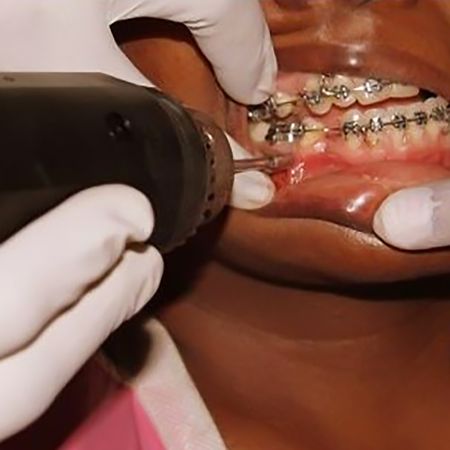
Artigo Disponível em Inglês Objetivos: Este ensaio clínico foi conduzido para avaliar a estabilidade e a taxa de falha de mini-implantes ortodônticos com superfície tratada, e determinar se elas diferem das dos mini-implantes ortodônticos sem superfície tratada. Desenho do estudo: Ensaio clínico randomizado com desenho de boca dividida. Instituição: Department of Orthodontics, SRM Dental College, Chennai/India. Participantes: Pacientes que necessitavam de mini-implantes...

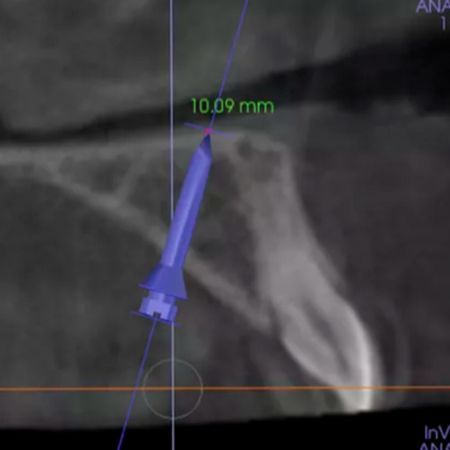
Introduction: Class III malocclusion should be intercepted and treated at early age, to prevent the necessity of future complex and expensive procedures. The orthopedic facemask therapy has the goal to achieve skeletal changes, minimizing side effects on dentition. The use of skeletal anchorage, combined with Alternate Rapid Maxillary Expansion and Constriction (Alt-RAMEC) protocol, may be effective in treating a greater number of growing Class III patients. Objective: To summarize the...

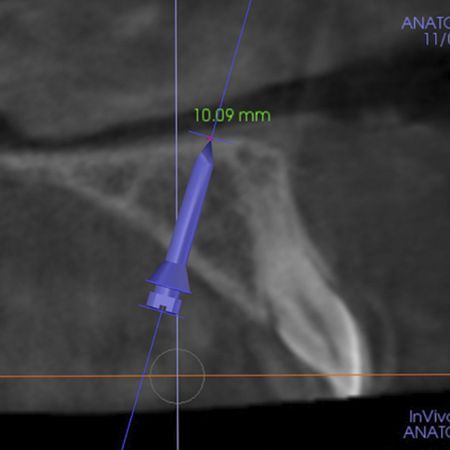
Introdução: A má oclusão de Classe III deve ser interceptada e tratada em idade precoce, a fim de evitar uma futura necessidade de procedimentos complexos e invasivos. O tratamento com máscara facial ortopédica tem o objetivo de obter alterações esqueléticas, minimizando os efeitos colaterais na dentição. O uso de ancoragem óssea em mini-implantes, associada ao protocolo Alt-RAMEC (Alternate Rapid Maxillary Expansion and Constriction) pode ser eficaz no tratamento de um grande...

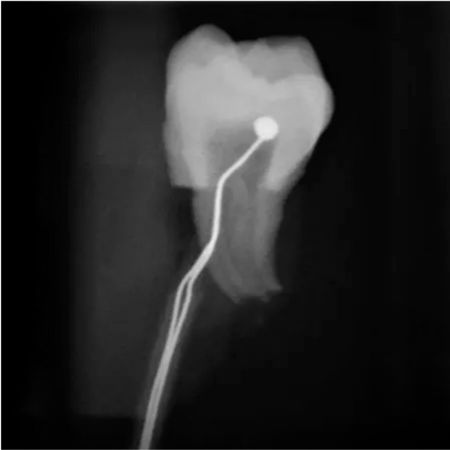
Objective: To evaluate the pulp chamber temperature rise (PCTR) in light-cure bonding of brackets with and without primer, in intact and restored mandibular central incisors (M1), maxillary first premolars (Mx4), and mandibular third molars (M8). Material and Methods: Ninety human teeth were included: M1 (n=30), Mx4 (n=30), and M8 (n=30). Light-cure bonding of brackets was performed in intact (n=60) and restored (n=30) teeth, with primer (n=60) or without (n=30) primer. PCTR was defined as...

Copyright © 1998 - 2022 DentalGO | Todos Direitos Reservados. DentalGO é uma marca Dental Press